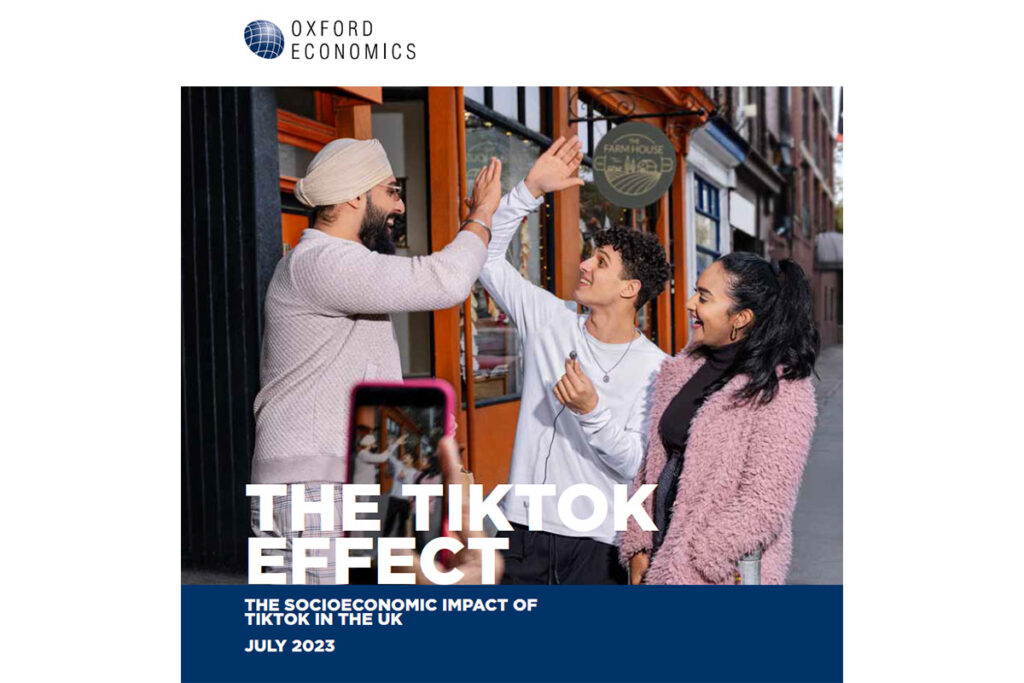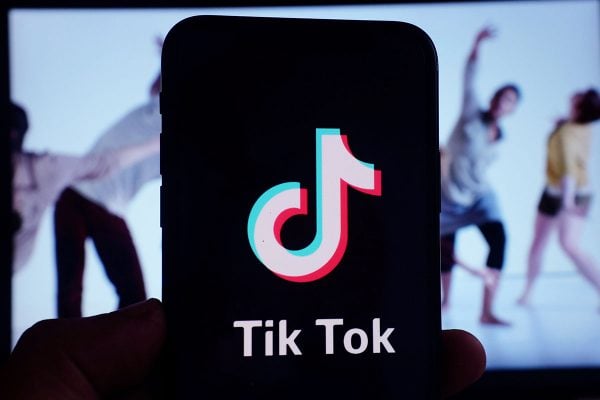We’ve written quite a bit about TikTok recently, and today the reason why we’re focusing on this relatively new sales channel can be revealed. The entertainment platform has released some ecommerce numbers and it’s been revealed that small businesses trading on TikTok have contributed £1.63 billion to the UK GDP. This is significant economic activity and, bearing in mind that TikTok only launched in the UK in 2018, it has quickly become a destination for UK small businesses to reach new audiences.
An Oxford Economics report on TikTok SMEs looked at the socioeconomic impact of TikTok in the UK and discovered investments from UK SMEs in advertising and marketing on TikTok generated a massive £1.2 billion in revenue in 2022 for UK SMEs, with the food and beverage sector benefiting the most (£0.6 billion).
When investments in supply chains, and wider economic impacts are factored in, the total Gross Value Added (GVA) of SMEs on TikTok reaches a total of £1.63 billion to UK GDP. Over the past few years, many brands like Little Moons (@littlemoonsmochi) and So Sweet (@sosweetshopuk) have been jumping on viral food trends, revolutionising the way we discover and appreciate culinary delights. Meanwhile, business services (£0.3 billion) and culture and entertainment (£0.2 billion) were also key sectors that saw an increase in revenue due to investments on TikTok.
Real businesses on TikTok
TikTok offer three main ways for brands and retailers to generate income, each of which is equally important, and offer your business different ways to engage:
- TikTok Shop – The ability for a brand to place their products on the platform and sell… you don’t even have to do anything yourself – simply offer an affiliate commission and let creators do the work of selling your products
- Advertising – The ability to promote your products and get them in front of potential customers
- Creators – Commission creators to include your product in their video content to build traffic, awareness, and sales.
Yesterday, at a round table in London, I was fortunate enough to meet three TikTok businesses who each work in different ways to generate an income on the platform. We’ll be bringing you their stories in the coming weeks, but here’s a short introduction to each of them:
Devon based @sosweetshopuk (as you might guess from their name) have half a dozen bricks and mortar shops and rely on ecommerce to support their sales. Their big break on TikTok came when a customer asked them to film their order being shipped and tag them. This lead to loads of future sales coming with messages asking for orders to be filmed, and has been so successful that they’ve had to take someone on full time just to keep up with TikTok order filming!
@maryxm.mx used to work in a school, but her TikTok business took over and once her income from selling as an affiliate took off and caught up with her regular income she quit to go full time. As a fashion and beauty specialist, she has attracted the attention of brands who’s products she chose to promote so much that they started to commission videos with direct payment for the production costs and her time!
@sugarcoatedsisters are a musical comedy duo, who have appeared at the Edinburgh Fringe and a week long run at the Soho Theatre, London. We’ve written about previously, and their most recent work was a commission with Marks & Spencer to produce a promo for the England Senior Women’s Team Womenswear Collection which you can read more about here.
These businesses are at the cutting edge of ecommerce and are examples of the economic impact TikTok are having in the UK. Whether it’s straight ecommerce sales, generating real life jobs, or supporting creators to achieve their life goals, after five years of being in the UK, the economic activity TikTok generates is still in it’s infancy and set to explode by the end of the decade. My assessment is that their growth is currently about where marketplaces were at the turn of the century, but it won’t take them 20 years to get to where marketplaces are today in terms of ecommerce revenues.
We’re incredibly humbled by the inspiring small businesses that are coming to TikTok every day to promote and sell their products. As this report shows, TikTok has been a huge benefit to small businesses up and down the UK, helping them find new customers, grow their businesses and create jobs.
We are proud of the role that TikTok is playing to help break down barriers to business. If you have a phone and a good idea, you can make a TikTok and it can be seen by millions around the world. We’ve also continued to invest in our offer for SMEs, from our ad products to TikTok Shop, so that we’re now making a meaningful difference in helping aspiring entrepreneurs to drive sales. I want to say a big thank you to our small business community who have made TikTok such a brilliant place to find unique products from all over the UK.
TikTok’s success is down to our amazing creators and community, and this report shows that TikTok is a truly motivating experience for our users. Whether it’s visiting a great new restaurant, purchasing a gadget based on the #TikTokMadeMeBuyIt phenomenon, or getting into reading via a #BookTok recommendation, TikTok is driving economic and cultural engagement off platform as well as on it.
– James Stafford, General Manager, Marketing & Operations, TikTok UKI & Nordics
TikTok Diversity
TikTok is driving growth for SMEs up and down the country, with around three-quarters (74%) of GDP contribution from SMEs occurring outside of London. TikTok’s accessible nature also extends to employment, with SME activity on TikTok supporting 32,000 jobs across all regions of the UK, with almost eight out of every 10 (78%) of these outside of London. The South East, North West and East of England are the regions beyond the capital that are seeing the most SME growth across both GDP contribution and jobs, thanks to TikTok.
The reseach also discovered that more owners of SMEs on TikTok are from ethnically diverse backgrounds (55%). Around four in 10 SMEs (38%) that use TikTok have ethnic minority ownership, compared with just a quarter (26%) of SMEs in the UK.
TikTok is also making it possible for younger entrepreneurs to get involved. Around three in 10 (31%) SMEs that use TikTok are owned by people under the age of 30, compared with just two in 10 (21%) in the UK as a whole.
Our research demonstrates how TikTok’s platform is being successfully leveraged by SMEs to grow their business and the significant level of economic activity that this sustains in the UK. In just a few short years, TikTok has shown that it delivers benefits for the small business community, supporting entrepreneurs from a range of backgrounds and circumstances, across the UK.
– Henry Worthington, Director of Economic Consulting, Oxford Economics
Business age & TikTok Impact
Younger businesses have been the early adopters making the most of TikTok, investing a bigger share of their social media marketing budgets to the platform compared to older businesses.
One in five (20%) businesses founded less than five years ago spend more than half of their social media budgets on TikTok. For businesses founded more than five years ago, only around one in 20 (6%) spend more than half of their social media budget on TikTok.
Overall, in the sectors analysed, younger SMEs are both more likely to use TikTok, and to use it with more force by dedicating more budget to it than their older counterparts.
Three-quarters (75%) of SMEs said that TikTok has had a positive impact on their ability to reach customers in the UK. A similar number agreed that TikTok had helped them engage with more customers and receive feedback (74%), market new products and services (72%), and stand out as a business more clearly (67%).
Even those SMEs that are not using TikTok are benefiting from it. Almost one in 10 SMEs (8%) that do not use TikTok say they have benefitted from exposure on the platform, when their products or locations have been used organically in TikTok videos.
You can download the full report detailing the economic activity that TikTok generate here.








